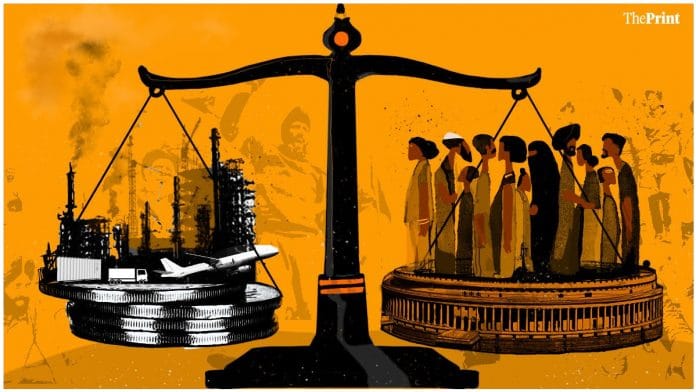Thank you dear subscribers, we are overwhelmed with your response.
Your Turn is a unique section from ThePrint featuring points of view from its subscribers. If you are a subscriber, have a point of view, please send it to us. If not, do subscribe here: https://theprint.in/
Democracy, as we know it today, is stretched beyond its limits. What began as a compact intellectual model, an elite agreement among equals has now become a forced experiment across wildly unequal societies. And nowhere is this strain more visible than in India.
Let’s be honest. India was never naturally democratic. The Congress party, often seen as the torchbearer of Indian democracy, is itself a creation of the British Empire, its child, not its challenger. In turn, the Indian Left is a product of the Congress’s ideological womb, and the Indian Right is merely a rebellious offspring of that same lineage. Our political landscape isn’t born of organic democratic evolution but of layered reactions to a colonial starting point.
Democracy presupposes certain conditions: relative equality among citizens, a shared cultural or linguistic identity, and a minimum threshold of common lived experience. It works in France. It works in Switzerland. It works in England. These are countries where historical processes gradually built systems where people could reasonably see each other as peers.
But India? We are a land of a thousand nations stitched together. Multiple religions, hundreds of languages, deep-seated caste structures, tribal systems, feudal remnants, and vast disparities in wealth and education. To expect elections to solve this complexity is like hoping a thermostat can fix a building with no roof.
The reality is sobering. The sheer scale of diversity in India makes democratic consensus almost impossible. We are not a society of equals voting in good faith. We are fragments of competing blocs hoping to capture the state machinery for our own protection or profit.
And yet, our people have tried. For decades, Indians have poured immense energy into making democracy work. We’ve celebrated elections as festivals. We’ve placed our faith in institutions. We’ve waited patiently for governance to catch up with the dream. But the outcomes are clear: even after decades of independence, we remain mired in dysfunction, with real progress stunted by the very system we idealize.
Democracy, in its original European form, was an aristocratic invention. A council of landed elites deciding policy among themselves minus the king. That was the Greek model. That was the British parliamentary seed. The concept was clear: governance without monarchy, but still within a club of equals.
The idea of universal adult franchise is not natural to this model. It was an extension, a well-meaning but structurally flawed expansion. In societies with deep internal inequality, this version of democracy often fails to produce true representation. Instead, it breeds demagogues, populists, and charismatic strongmen.
Look around: Rahul Gandhi, Narendra Modi, Donald Trump, Justin Trudeau, Liz Truss. These are not signs of healthy democratic evolution. They are symptoms of a model overstretched. When democracy loses its intellectual boundaries and when it’s applied indiscriminately across contexts, it stops being democracy and starts becoming a masquerade.
India’s tragedy is not that we are bad at democracy. It is that we were never equipped for this model in the first place. And yet, we continue to cling to its form without acknowledging its foundational limits.
Intellectual models must have boundaries. They work within contexts. Democracy, too, had boundaries when it was born. We’ve long since crossed them. And what remains is not a celebration of people’s power, but a confused, chaotic system eating itself from within.
It’s time we admit: not every country is meant to function democratically in the same way. India needs governance models that respect its complexity, not foreign templates that ignore it.
These pieces are being published as they have been received – they have not been edited/fact-checked by ThePrint.


